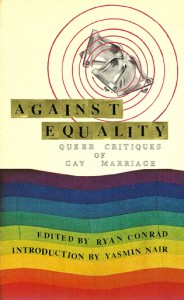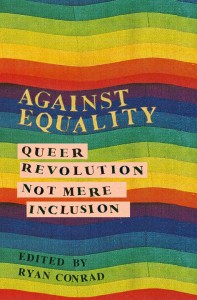
Ten years ago this month, Against Equality published its first pocket-sized anthology, Queer Critiques of Gay Marriage. It was an exciting time when critiques of the monied state-by-state campaigns for gay marriage in the United States were fewer and further between than they are today, and liberals wrung their hands far less about gay “rights.” During a moment that could be characterized as a liberal wet dream, our radical voices were largely marginalized and dispersed as we collaborated from across the continent. Through the online AE archive and our publications, we became a boisterous chorus smashing the assumed queer consensus on issues like gay marriage, open military service, and hate crimes legislation—the holy trinity of gay neoliberal politics. We pointed out, through an extensive and deep archive that included historical works like those of Emma Goldman and Voltairine de Cleyre along side gay liberation writing and contemporary works that a queer radical vision has been shaping the world much longer than a mainstream gay one. Until AE appeared on the web and collected all this in one place, many of us had felt increasingly frustrated with the erasure of queer radical politics. The Gay Marriage book was followed by Don’t Ask to Fight Their Wars and Prisons Will Not Protect You over the next two years.
This work connected us with many interesting people doing important activist and intellectual work centering an economic analysis of gay politics. This same work also garnered us death threats from establishment gays when we pointed out their wildly conservative political vision, or that their lord and pop culture saviour Lady Gaga with her banal “Born This Way” anthem was emblematic of this narrow politics. It was a strange moment during the book tour in 2011, having to tell our event hosts that gay people had threatened to show up and stab us, and that we were nervous about it despite knowing that online threats often don’t materialize. Even a few well-meaning Anti-Racist Action members sent us emails about how they were going to bash our homophobic heads in—apparently they didn’t get the memo that we are a bunch of queers trying to stay alive.
 Nonetheless, we persisted, continued building our digital archive, and the three pocket-sized books eventually became the complete anthology, Against Equality: Queer Revolution, Not Mere Inclusion published by AK Press, (both in paper and e-book form). The effort by AE and others in naming this political moment and pushing back against the shrinking of the queer political imagination is taken up broadly now that the stakes are lowered, particularly as the national administration and the Supreme Court have changed. Since gay marriage is now the law of the land in the US, emotional desperation and sentimental attachment to gay marriage have subsided. Lots of academics and so-called public intellectuals who supported or remained silent on the issue of gay marriage have published think pieces in its aftermath, questioning whether it was a good idea after all. There’s nothing like showing up late to the party once nothing is at stake. (Did the invitations get lost in the mail?). Writers who once swore they would give blowjobs to anyone who made gay marriage happen are now spinning off columns at places like The Guardian about the horrors, oh, the horrors of the conservative gay movement. Surely a number of job promotions were granted and increasingly irrelevant careers were revived on such bold stances. It’s been a bizarre decade, and we haven’t forgotten that liberal gays and lesbians, often white, cis, urban, and upwardly mobile (although certainly not exclusively), have never sought liberation, but mere inclusion in the status quo. This is a tedious, precarious, narrow dream of the future that most of us cannot afford.
Nonetheless, we persisted, continued building our digital archive, and the three pocket-sized books eventually became the complete anthology, Against Equality: Queer Revolution, Not Mere Inclusion published by AK Press, (both in paper and e-book form). The effort by AE and others in naming this political moment and pushing back against the shrinking of the queer political imagination is taken up broadly now that the stakes are lowered, particularly as the national administration and the Supreme Court have changed. Since gay marriage is now the law of the land in the US, emotional desperation and sentimental attachment to gay marriage have subsided. Lots of academics and so-called public intellectuals who supported or remained silent on the issue of gay marriage have published think pieces in its aftermath, questioning whether it was a good idea after all. There’s nothing like showing up late to the party once nothing is at stake. (Did the invitations get lost in the mail?). Writers who once swore they would give blowjobs to anyone who made gay marriage happen are now spinning off columns at places like The Guardian about the horrors, oh, the horrors of the conservative gay movement. Surely a number of job promotions were granted and increasingly irrelevant careers were revived on such bold stances. It’s been a bizarre decade, and we haven’t forgotten that liberal gays and lesbians, often white, cis, urban, and upwardly mobile (although certainly not exclusively), have never sought liberation, but mere inclusion in the status quo. This is a tedious, precarious, narrow dream of the future that most of us cannot afford.
AE is now a static digital archive. Members of our collective have largely moved on to other pressing projects, and we are heartened to see that our work continues to have ripple effects on contemporary queers and the movements they join. Some take up our critiques explicitly, while others add to them in new and unexpected ways. AE, among others, undoubtedly shifted the national conversation on gay marriage and inclusion politics more broadly. We are proud to have provided activist tools for thinking and dreaming against the machinations of neoliberal single-issue identity politics. Thankfully many libraries in North America and Europe carry our books and make our work free and accessible. For those who choose to purchase their own copies, the royalties are returned to our most vulnerable communities through queer and trans prisoner support organizations like LGBT Books to Prisoners and the Prisoner Correspondence Project.
The work of reviving the queer political imagination is both ongoing and urgent, and is activated through individual and collective writing and organizing. We find ourselves both disoriented and excited about the future as we see thousands of radical projects bloom today. In the last decade we have witnessed much that gives us hope, like the intertwining of queer, trans, Black, and indigenous issues that are now taken seriously where once there was silence, and prison abolition is now a matter of public discussion. The work is unfinished for all of us and we remain wary of how anti-racist/anti-Blackness work, as well as the struggles against trans oppression and prisons, are already being quietly appropriated by nonprofits bent not on creating transformative change, but profitable foundations and salaries for handful from the professional class. Hate crimes legislation is still the default solution to anti-trans violence even though radical trans and queer people constantly militate against such laws that expand the reach of the prison industrial complex. Inclusion in the military keeps reappearing as some kind of a jobs program solution to trans and gay poverty and a lack of economic opportunity. Queer people everywhere, living at the intersections of race, poverty, stigma, and failed neoliberal systems, are multiply affected by a pandemic whose worst effects are visited upon the most vulnerable and marginalized. What we said then is still true: marriage, military, and prisons will not save us and in our fights ahead we must divest from such campaigns as they keep rearing back up, presented to us by politicians and many gay activists as quick-fixes based on the flimsy notion that inclusion is everything.
We face difficult times ahead, but we take heart in the enormous efforts and changes brought about by our friends and comrades everywhere in the world who see the most radical possibilities for better worlds even in the worst of times. We can’t wait to see what fantastic possibilities are yet to come!

Sorry, the comment form is closed at this time.